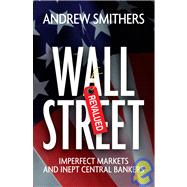
Note: Supplemental materials are not guaranteed with Rental or Used book purchases.
Purchase Benefits
What is included with this book?
| Foreword | p. v |
| Introduction | p. 1 |
| Synopsis | p. 15 |
| Interest Rate Levels and the Stock Market | p. 25 |
| Interest Rate Changes and Share Price Changes | p. 37 |
| Household Savings and the Stock Market | p. 41 |
| A Moderately rather than a Perfectly Efficient Market | p. 49 |
| The Efficient Market Hypothesis | p. 57 |
| Testing the Imperfectly Efficient Market Hypothesis | p. 67 |
| Other Claims for Valuing Equities | p. 81 |
| Forecasting Returns without Using Value | p. 91 |
| Valuing Stock Markets by Hindsight Combined with Subsequent Returns | p. 97 |
| House Prices | p. 105 |
| The Price of Liquidity - The Return for Holding Illiquid Assets | p. 109 |
| The Return on Equities and the Return on Equity Portfolios | p. 115 |
| The General Undesirability of Leveraging Equity Portfolios | p. 121 |
| A Rare Exception to the Rule against Leverage | p. 131 |
| Profits are Overstated | p. 137 |
| Intangibles | p. 145 |
| Accounting Issues | p. 159 |
| The Impact on q | p. 171 |
| Problems with Valuing the Markets of Developing Economies | p. 175 |
| Central Banks' Response to Asset Prices | p. 181 |
| The Response to Asset Prices from Investors, Fund Managers and Pension Consultants | p. 191 |
| International Imbalances | p. 195 |
| Summing Up | p. 197 |
| Sources and Obligations | p. 199 |
| Glossary of Terms | p. 203 |
| Interest Rates, Profits and Share Prices | p. 209 |
| Examples of the Current (Trailing) and Next Year's (Prospective) PEs Giving Misleading Guides to Value | p. 217 |
| Real Returns from Equity Markets Comparing 1899-1954 with 1954-2008 | p. 219 |
| Errors in Inflation Expectations and the Impact on Bond Returns | p. 221 |
| An Algebraic Demonstration that Negative Serial Correlation can make the Leverage of an Equity Portfolio Unattractive | p. 233 |
| Correlations between International Stock Markets | p. 235 |
| Bibliography | p. 237 |
| Index | p. 239 |
| Table of Contents provided by Ingram. All Rights Reserved. |
The New copy of this book will include any supplemental materials advertised. Please check the title of the book to determine if it should include any access cards, study guides, lab manuals, CDs, etc.
The Used, Rental and eBook copies of this book are not guaranteed to include any supplemental materials. Typically, only the book itself is included. This is true even if the title states it includes any access cards, study guides, lab manuals, CDs, etc.